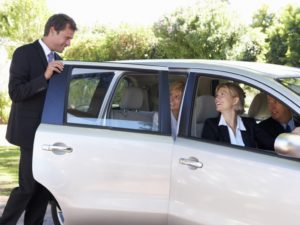What Happens When You’re Injured While Carpooling to Work?
Posted April 3rd, 2018 by Anthony Carbone, PC.
Categories: Workers Compensation.
 It’s your daily routine. Each and every day, one of your coworkers pick you up so you and some others can carpool to the office. In truth, you are grateful for the ride; you’re not much of a morning person, and the ridesharing arrangement allows you time to wake up. Then it happens. The driver is involved in an intersection accident. As a result, you suffer rather severe injuries. Do you have options when it comes to making a claim?
It’s your daily routine. Each and every day, one of your coworkers pick you up so you and some others can carpool to the office. In truth, you are grateful for the ride; you’re not much of a morning person, and the ridesharing arrangement allows you time to wake up. Then it happens. The driver is involved in an intersection accident. As a result, you suffer rather severe injuries. Do you have options when it comes to making a claim?
Of course, this is just one ridesharing scenario that warrants contemplation. At the recommendation of friends, you know to go stand at a particular corner every morning. A factory in another city looks for day workers at the named location. If you get there early enough, there’s a chance that you’ll earn at least get a day’s wages. The company provides the transportation to their place of business in Middlesex County.
With the advent of Lyft and Uber, ridesharing often takes on a new meaning. In this context, it’s the idea that the employer provides transportation services. In the case of carpooling, the idea is that a group of employees get together to commute to work. Often, they rotate cars on a weekly or monthly basis.
However, what happens if you’re injured while carpooling together? The question often comes down as to whom is responsible for your medical bills. What about ridesharing provided by your employer? Are you entitled to workers’ compensation benefits?
Ridesharing and Workers Compensation
NJSA 34:15-36 provides some valuable insight regarding different definitions regarding workers’ compensation. Eligibility for benefits generally requires that the employee was in the course of his or her employment when the accident occurs. However, travel time may also call for benefits in select circumstances.
First, it will be essential to identify the vehicle used for the ridesharing arrangement. Here are some questions for consideration:
- Did the employer own, lease, or contract the vehicle used to transport employees?
- Was the employee required to use the rideshare arrangement as a condition of employment?
If either of these issues is answered in the affirmative, the worker’s employment begins at the time they are picked up at their home or designated location with plans of transport to the workplace.
In the meantime, there are some other considerations when it comes to transportation provided by employers. It could be that you were one of many waiting for a ride to work in a factory. You’ve never worked for the company before, so you are technically not their employee. On the way to sign up for work, the company van crashes. You sustain horrific injuries. Are you entitled to workers’ compensation benefits? It’s certainly something to review with an experienced workers’ compensation attorney.
What if the driver of the business van is at fault in the accident? Can you pursue a claim directly against him or her? Once again, your attorney will need to review the circumstances of the crash. Unless the harm was intentional, there’s a good chance you are only entitled to make a claim for workers’ compensation benefits.
Carpooling and Workers’ Compensation
What about carpooling situations? Once again, there are a couple of tests to determine compensability under the New Jersey Workers’ Compensation Act.
First, did the employer provide the vehicle? Depending on the circumstances, you or an injured coworker may be entitled to claim workers’ compensation benefits. Additionally, if the driver of the car is a co-employee, there are limitations on whether you can bring a claim for any of his or her actions that led to the accident.
When determining whether those injured while carpooling are entitled to workers’ compensation, there are other considerations as well. Was the arrangement set up by you and your colleagues for the daily commute to the same office? There’s a chance that you are not eligible for benefits, but should still review the circumstances of the accident with your lawyer.
That said, you may carpool to go to various job sites different than a regular office. For example, you might be a laborer who carpools to different construction projects with other workers. By the same token, you could travel with a company manager to perform sales calls. In either case, your claim may be considered a work-related accident.
Contact Us
When it comes down to it, both carpooling and ridesharing arrangements require careful evaluation when determining the feasibility of a workers’ compensation claim. At the Law Offices of Anthony Carbone, we have more than two decades of experience helping injured workers. Give us a call to see what we can do for you.


